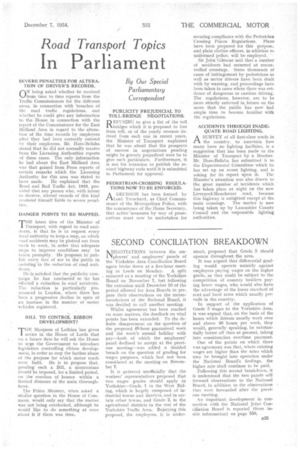SECOND CONCILIATION BREAKDOWN
Page 39

If you've noticed an error in this article please click here to report it so we can fix it.
TaLTEGOTIATIONS between the emplayers' and employees' panels of the Yorkshire Area Conciliation Board again broke down at a five-hour meet
ing in Leeds on Monday. A split occurred at a meeting of the Yorkshire Board on November 7, but following the extension until December 10 of the period allowed for Area Boards to prepare their observations on the recommendations of the National Board, it was decided to call another meeting.
Whilst agreement has been reached on some matters, the deadlock on vital points has been extended. To the definite disagreement on the question of the proposed 48-hour guaranteed week and the week's annual holiday with pay—both of which the employers' panel declined to accept at the previous meeting—was added a decided breach on the question of grading for wages purposes, which had not been considered at the meeting on November 7.
It is gathered. unofficially that the workers' representatives proposed that two wages grades should apply in Yorkshire—Grade I in the West Riding, which is largely composed of industrial towns and districts, and in certain other towns, and Grade 2, in the agricultural districts in the rest of the Yorkshire Traffic Area. Rejecting this proposal, the employers, it is under
stood, proposed that Grade 3 should operate throughout the area.
It was argued that differential grading would operate unfairly against employers paying wages on the higher grade, as they could be subject to the competition of country hauliers paying lower wages, who would also, have the advantage of the lower standard of rent and local rates which usually prevails in the country.
In support of the application of Grade 3 wages to the Yorkshire Area, it was argued that, on the basis of .the hours which drivers usually work over and above 48 hours per week, they would, generally speaking, be substantially better off than at present, taking into consideration overtime payment.
One of the points on which there was agreement was that, where existing wages are higher than the rates which may be brought into operation under the National -Board's findings, the higher rate shall continue to be paid. Following this second breakdown, it is understood that the two panels will forward observations to the National Board, in addition to the observations that were forwarded after the previous meeting.
An important development in connection with the National joint Conciliation Board is reported (from inside information) on page 550.




























































































